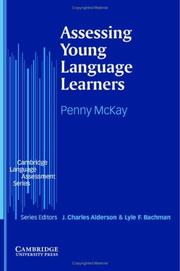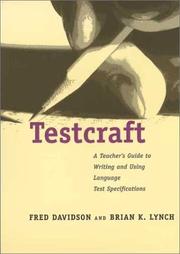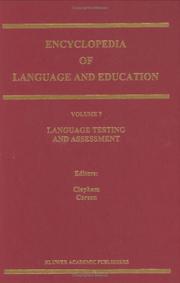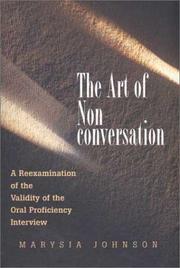| Listing 1 - 10 of 92 | << page >> |
Sort by
|

ISBN: 0511733097 1139169998 0521841380 0521601231 Year: 2006 Publisher: Cambridge : Cambridge University Press,
Abstract | Keywords | Export | Availability | Bookmark
 Loading...
Loading...Choose an application
- Reference Manager
- EndNote
- RefWorks (Direct export to RefWorks)
In this book the author builds a comprehensive framework for the assessment of young language learners in both foreign language and second language learning situations. She begins by considering why we need a special book on young learner assessment, and describes the nature of young learner language learning. The assessment approach is task-based and is centred around tasks and techniques suitable for young learners, with particular emphasis on classroom assessment. Oral language assessment, and reading and writing assessment are addressed in separate chapters, as is the large-scale testing of young learners. Underpinned by sound theory, the book is full of practical guidelines, and draws on examples of assessment contexts, issues and practices from around the world. Assessing Young Language Learners was winner of the Kenneth W Mildenberger Prize in 2006.
Language and languages --- Language assessment --- Ability testing. --- Study and teaching
Book
ISBN: 1009024728 110871482X Year: 2020 Publisher: Cambridge : Cambridge University Press,
Abstract | Keywords | Export | Availability | Bookmark
 Loading...
Loading...Choose an application
- Reference Manager
- EndNote
- RefWorks (Direct export to RefWorks)
This book provides an accessible guide to concepts in language testing and the testing of specific skills and systems. It combines theory and practical recommendations to help teachers understand the principles of testing and how they can be applied, supporting them to write better tests. The third edition has been extensively revised and updated to reflect recent developments in the field, while retaining the straightforward approach that made the earlier editions essential reading for trainee and experienced teachers alike. It features new content on technology, including computer adaptive testing and the use of automated scoring for all skills. It also includes an extended discussion of language testers' responsibilities, new chapters on non-testing methods of assessment and a checklist to help teachers choose tests.
Language and languages --- Ability testing. --- Language assessment --- Study and teaching
Periodical
ISSN: 15434311 Year: 2004 Publisher: [Mahwah, N.J.] : [Philadelphia, PA] : Lawrence Erlbaum Associates, Inc., Taylor & Francis
Abstract | Keywords | Export | Availability | Bookmark
 Loading...
Loading...Choose an application
- Reference Manager
- EndNote
- RefWorks (Direct export to RefWorks)
Language and languages --- Ability testing --- Ability testing. --- Language assessment --- Study and teaching --- Langage et langues --- Tests d'aptitude

ISBN: 0300090064 9786611722791 1281722790 0300133812 9780300133813 9780300090062 9781281722799 Year: 2002 Publisher: New Haven : Yale University Press,
Abstract | Keywords | Export | Availability | Bookmark
 Loading...
Loading...Choose an application
- Reference Manager
- EndNote
- RefWorks (Direct export to RefWorks)
The creation of language tests is-and should be-a craft that is accessible and doable not only by a few language test experts, but also by many others who are involved in second/foreign language education, say the authors of this clear and timely book. Fred Davidson and Brian Lynch offer language educators a how-to guide for creating tests that reliably measure exactly what they are intended to measure. Classroom teachers, language administrators, and professors of language testing courses will find in this book an easy and flexible approach to language testing as well as the tools they need to develop tests appropriate to their individual needs. Davidson and Lynch explain criterion-related language test development, a process that focuses on the early stages of test development when the criterion to be tested is defined, specifications are established, and items and tasks are written. This process helps clarify the description of what is being measured by a test and enables teachers to give input on test design in any instructional setting. Informed by extensive research in criterion-referenced measurement, this book invites all language educators to participate in the craft of test development and shows them how to go about it.
Language and languages --- Langage et langues --- Ability testing. --- Tests d'aptitude --- Vreemdetalenonderwijs --- Tests. --- Language assessment --- Study and teaching
Book
ISBN: 3110424150 3110424274 3110424142 3110427397 Year: 2015 Publisher: De Gruyter
Abstract | Keywords | Export | Availability | Bookmark
 Loading...
Loading...Choose an application
- Reference Manager
- EndNote
- RefWorks (Direct export to RefWorks)
Die Studie ist in dem bisher nur begrenzt fruchtbar gemachten Überlappungsbereich von Gesprächslinguistik und Areallinguistik angesiedelt und zielt auf die Etablierung eines alternativen Zugangs zu sprachlicher Variation ab, der dem konkreten Sprachgebrauch bereits in der Theoriebildung einen anderen Status zuweist als bis dato üblich. Durch die systematische Integration interaktionaler Gesichtspunkte in die Untersuchung arealsprachlicher Variationsspektren zeigt die Arbeit einen grundlegenden Perspektivwechsel in der areallinguistischen Forschung auf: Aspekte des sozialen Handelns, die Kontextualisierung interaktiver Bedeutung und die Heterogenität alltäglichen Sprachgebrauchs werden theoretisch und emprisch systematisch zusammengeführt. Es wird schließlich auf der Grundlage einer weitgreifenden Theoriediskussion und einer darauf aufsattelnden Methodenreflexion ein eigener Methodenapparat entwickelt, um im empirischen Teil auf der Basis authentischer Gesprächsdaten aus Norddeutschland verschiedene arealsprachliche Variationsspektren im Hinblick auf sprachstrukturelle und gesprächsfunktionale Aspekte zu beschreiben und zu kontrastieren. Open Access:Die freie Verfügbarkeit der E-Book-Ausgabe dieser Publikation wurde im Juli 2019 nachträglich ermöglicht durch den Fachinformationsdienst Linguistik.https://www.linguistik.de/ This study focuses on a previously untapped interface between discourse and areal linguistics. It assigns a different primary status to usage at the stage of theory development. Using actual discourse data from Northern Germany, it provides an integrated comparative description of areal linguistic variations in terms of their linguistic structure and discursive function.
Language and languages --- Linguistics --- Ability testing. --- Research. --- Language assessment --- Study and teaching --- Areal Linguistics. --- Conversational Linguistics. --- Everyday Language. --- Linguistic Variation.
Periodical
Abstract | Keywords | Export | Availability | Bookmark
 Loading...
Loading...Choose an application
- Reference Manager
- EndNote
- RefWorks (Direct export to RefWorks)
Book
ISBN: 1617614718 9781617614712 9781607411277 160741127X Year: 2010 Publisher: Hauppauge, N.Y. : Nova Science Publishers, Inc.,
Abstract | Keywords | Export | Availability | Bookmark
 Loading...
Loading...Choose an application
- Reference Manager
- EndNote
- RefWorks (Direct export to RefWorks)
Language and languages --- Communicative competence. --- Competence, Communicative --- Communication --- Competence and performance (Linguistics) --- Psycholinguistics --- Language assessment --- Ability testing. --- Study and teaching

ISBN: 0792347021 9780792347026 Year: 1997 Volume: 7 Publisher: Dordrecht: Kluwer,
Abstract | Keywords | Export | Availability | Bookmark
 Loading...
Loading...Choose an application
- Reference Manager
- EndNote
- RefWorks (Direct export to RefWorks)
Didactic evaluation --- Didactics of languages --- Language and languages --- Ability testing. --- Language assessment --- Ability testing --- Study and teaching --- Language and languages - Ability testing.
Periodical
Abstract | Keywords | Export | Availability | Bookmark
 Loading...
Loading...Choose an application
- Reference Manager
- EndNote
- RefWorks (Direct export to RefWorks)
language teaching --- language learning --- language assessment --- language proficiency --- second language education --- Language and education --- Educational linguistics --- Education --- Language and languages --- Language and education.

ISBN: 0300090021 9786611730253 1281730254 0300129440 Year: 2001 Publisher: New Haven Yale University Press
Abstract | Keywords | Export | Availability | Bookmark
 Loading...
Loading...Choose an application
- Reference Manager
- EndNote
- RefWorks (Direct export to RefWorks)
The Oral Proficiency Interview (OPI) is a widely accepted instrument for assessing second and foreign language ability. It is used by the Foreign Language Institute, the Defense Language Institute, Educational Testing Service, the American Council on the Teaching of Foreign Languages, and at many universities in the United States. The Art of Non-Conversation examines the components of speaking ability and asks whether the OPI is a valid instrument for assessing them. Marysia Johnson applies the latest insights from discourse and conversational analysis to determine the nature of the OPI's communicative speech event and investigate its construct validity within Messick's definition of validity. She discusses models of speaking ability-several communicative competence models, an interactional competence model, and a model of spoken interaction based on Vygotsky's sociocultural theory of learning. Finally she proposes a new model to test language proficiency drawn from sociocultural theory, one that considers language ability to be reflective of the sociocultural and institutional contexts in which the language has been acquired.
Language and languages --- Oral communication --- Communicative competence --- Ability testing. --- Testing. --- Competence, Communicative --- Communication --- Competence and performance (Linguistics) --- Psycholinguistics --- Language assessment --- Study and teaching
| Listing 1 - 10 of 92 | << page >> |
Sort by
|

 Search
Search Feedback
Feedback About UniCat
About UniCat  Help
Help News
News